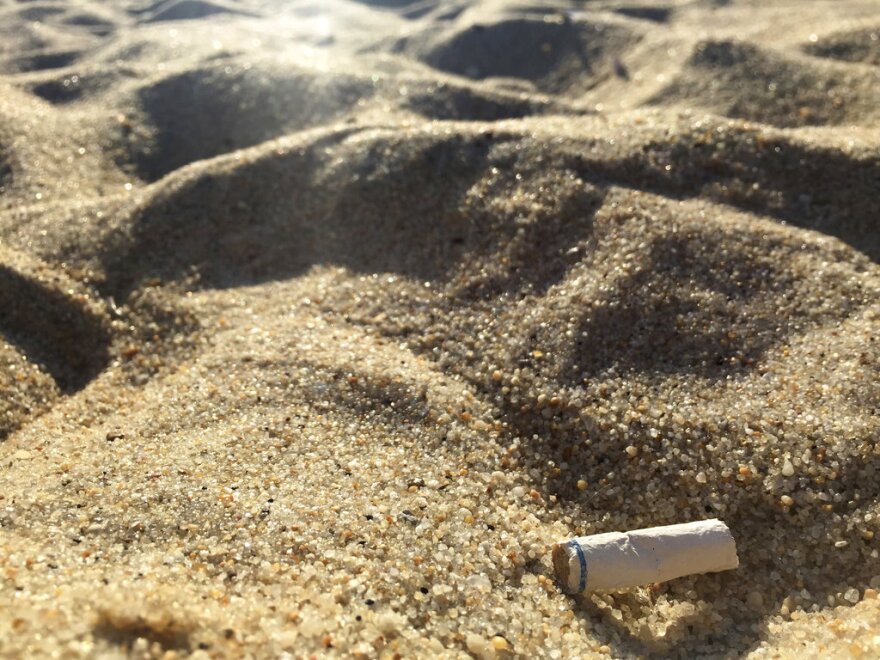Visiting from Tennessee, Paul and Gail Odom hadn’t noticed people smoking or cigarette butts strewn on the sand as they strolled along the lapping Gulf of Mexico waters Thursday morning.
But shortly after being told about a proposed change that would ban smoking cigarettes on Panama City Beach, they saw a pile of discarded butts in the sand.
Paul Odom said people shouldn’t leave cigarette butts in the sand, while saying smoking is “everybody’s individual choice.” Gale Odom, pointing to an area away from a line of beach chairs and the water, added “I think if they’re going to smoke, they should smoke like there, away from people.”
Mallory Archer, a Mississippi resident enjoying a final day of vacation by relaxing on the beach, was more straightforward in supporting the proposed ban.
“That's easy for me to say because I'm not a smoker,” Archer said. “So, I recognize that.”
Panama City Beach is among several communities that in the coming weeks and months could move forward under a new state law that allows cities and counties to ban smoking cigarettes and vaping at locally controlled beaches and parks.
Panama City Beach Mayor Mark Sheldon said the city council is waiting for legal direction on the proposed change. But with the issue expected to be taken up later this month, he sees the proposal as helping the environment by limiting trash and simply being “the right thing to do.”
"We've seen smoking bans in other areas, whether it's restaurants or public places, and this is another public place,” Sheldon said.
Florida voters in 2002 approved a constitutional amendment that prohibited smoking in enclosed indoor workplaces, including most restaurants and bars.
While that change drew opposition, Sheldon said he’s heard objections from only two people to the proposed beach-smoking ban since it came before the council several weeks ago. People who rent beach chairs have offered some of the strongest support.
“If somebody rents a chair from a beach vendor, and they're out there with their family, and somebody rents a chair next to them, you can't get away from it if they start smoking. You're locked into that chair,” Sheldon said. “That's your space. They don't just move around those chairs. So, for them, we want to make a better quality-of-life issue. And that's who we are. We're the real fun beach."
The state has long controlled smoking regulations. But the new law (HB 105), signed in June by Gov. Ron DeSantis, gives authority to cities and counties to ban smoking at beaches and parks that they own.
The law, however, included an exemption that prevents local governments from banning unfiltered cigars.
Before the measure passed, Senate sponsor Joe Gruters, R-Sarasota, drew a distinction between unfiltered cigars and cigarettes because he said filtered cigarette butts don't quickly biodegrade.
“If you live near a beach, the number one picked-up item consistently on an annual basis over and over again, are cigarette butts,” Gruters said March 2. “What happens all the time is this second-hand smoke, to me, it is disgusting. But what's even more disgusting is when you reach into the sand and pick up one of those butts. And those filters that are in the cigarettes are what ends up in the water, destroying the environment.”
But exempting unfiltered cigars drew some criticism.
Sen. Jason Pizzo, D-North Miami Beach, argued that not allowing local governments to ban all forms of smoking at beaches and could lead to discrimination.
“When you can have five guys sitting around smoking fat cigars and one Black kid over here smoking a Black & Mild, and the cop can go and exercise probable cause on that person and has to ignore the five, you have a problem,” Pizzo said during the Senate debate, referring to a brand of cigars with filter tips.
Along with Panama City Beach, communities such as Miami Beach and St. Petersburg are considering smoking bans.
Miami Beach commissioners at a July 20 meeting took an initial vote on a beach-smoking ban and are expected to take another vote this month. The proposal spells out fines up to $500 with the chance of up to 60 days in jail, though commissioners said they don’t expect anyone to spend time in jail for violating the ban.
Meanwhile, the St. Petersburg City Council is expected to move forward with a smoking-ban ordinance this month. Ben James, an attorney for the city, said the ordinance would prohibit smoking in all areas of public beaches and city parks, and violations could result in fines up to $500.
“Some people may say, ‘Oh, is this overreach?’” St. Petersburg City Council member Lisset Hanewicz said during a committee meeting last week. “You know, we regulate smoking, as it is, indoors. And it's been happening for a long time. The state of Florida a long time ago was the first to decide to sue the tobacco companies … because of the cost that we all bear because of the health costs.”
Under the St. Petersburg proposal, people would have about a 90-day period to become aware of the change, with enforcement beginning Jan. 1. Council member Gina Driscoll said the phased approach would give time to build awareness and put signs in parks.
“I hope that we can count on our non-profit partners that work with us on litter management to help spread the word and really work as a team to educate the public and make sure that this is seen as a positive thing, that's really about litter and about good environmental stewardship,” Driscoll said during the meeting.
Sheldon said Panama City Beach might consider a similar phased approach.
Patricia DePlasco, executive director of Keep Pinellas Beautiful, told St. Petersburg council members that National Geographic has estimated between 4.5 trillion and 5 trillion cigarette butts aren’t properly discarded annually.
“There is a problem. And it's unfortunate that smokers can’t put their butts where they belong,” DePlasco said.
9(MDAyNDY5ODMwMDEyMjg3NjMzMTE1ZjE2MA001))
Copyright 2022 Health News Florida



